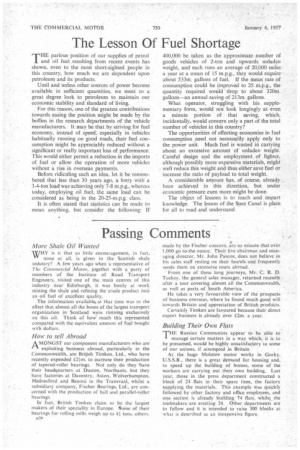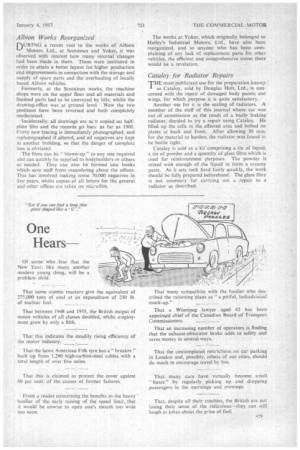Passing Comments
Page 36

Page 37

If you've noticed an error in this article please click here to report it so we can fix it.
More Shale Oil Wanted
wHY is it that so little encouragement, in fact,
none at all, is given to the Scottish shale industry? A few years ago when a•representative of The Commercial Motor, j.ogether with a party of members of the Institute of Road Transport Engineers, visited one of the main centres of this industry near Edinburgh, it was busily at work mining the shale and refining the crude product into an oil fuel of excellent quality.
The information available, at that time was to the effect that almost all the buses of the largest transport organization in Scotland were running exclusively on this oil. Think of how much this represented compared with the equivalent amount of fuel bought with dollars.
How to sell Abroad
AMONGST our component manufacturers who are exploiting business abroad, particularly in the Commonwealth, are British Timken, Ltd., who have recently expended £2.1m. to increase their production of tapered-roller bearings. Not only do they have their headquarters at Duston. Northants, but they have factories at Daventry, Aston. Wolverhampton, Hednesford and Benoni in the Transvaal, whilst a subsidiary company, Fischer Bearings, Ltd., are concerned with the production of ball and parallel-roller bearings.
In fact, British Timken claim to be the largest makers of their speciality in Europe. Some of their bearings for rolling mills weigh up to 41 tons. others, 82x made by the Fischer concern, are so minute that over 1,000 go 16.the ounce. Their live chairman and managing director, Mr. John Pascoe, does not believe in his sales staff resting on their laurels and frequently sends them on extensive tours abroad.
From one of these long journeys, Mr. C. R. D. Tuekcy. the general sales manager, returned recently after a tour covering almost all the Commonwealth, as well as parts of South America.
He takes a very favourable view of the prospects of business overseas, where he found much good will towards Britain and appreciation of British products.
Certainly Timken are favoured because their direct export business is already over £2m. a year.
Building Their Own Flats
T' Russian Communists appear to be able. to .
manage certain matters in a way which, it is to be presumed, would be highly unsatisfactory to some of our unions, if attempted in Britain.
At the huge Molotov motor works in Gorky, U.S.S.R., there is a great demand for housing and, to speed up the building of homes, some of the workers are carrying out their own building. Last year, those in the press department constructed a block of 24 flats in their spare time, the factory supplying the materials. This example was quickly followed by other factory and office employees, and one section is already building 74 flats, whilst the toolmakers are erecting 24. Other departments are to follow and it is intended to raise 300 blocks at what is described as an inexpensive figure.
Albion Works Reorganized
nURING a recent visit to the works of Albion
Motors, Ltd., at Scotstoun and Yoker, it was observed with interest how many internal changes had been made in them. These were instituted in order to attain a better layout for higher production and improvements in connection with the storage and supply of spare parts and the overhauling of locally based Albion vehicles.
Formerly, at the Scotstoun works, the machine shops were on the upper floor and all materials and finished parts had to be conveyed by lifts, whilst the drawing-office was at ground level. Now the two positions have been reversed and both completely modernized.
Incidentally, all drawings are na.: ri copied on halfplate film and the records go 'met,: as far as 1900. Every new tracing is immediately photographed, and rephotographed if altered, and all negatives are kept . in another building, so that the danger of complete loss is obviated.
The films can be " blown-up " to any size required and can quickly be supplied to bodybuilders or others as needed. They can also be formed into books . which save staff from meandering about the offices. This has involved making some 70,000 negatives in five years. whilst copies of all letters for the general and other offices are taken on microfilm. The works at Yoker, which originally belonged to Halley's Industrial Motors, Ltd,, have also been reorganized, and to anyone who has been complaining of any lack of replacement parts for other vehicles, the efficient and comprehensive stores there would be a revelation.
Cataloy for Radiator Repairs
THE most publicized use for the preparation know‘n ' as Cataloy, sold by Douglas Holt, Ltd., is concerned with the repair of damaged body panels and wings, for which purpose it is quite satisfactory.
Another use for it is the sealing of radiators. A member of the staff of this journal whose car was out of commission as the result of a badly leaking radiator, decided to try a repair using Cataloy. He filled up the cells in the affected area and bolted on plates at back and front. After allowing 30 mm. for the material to harden, the radiator was fdund to be bottle tight.
Cataloy is sold as a kircomprising a tin of liquid, a tin of powder and a quantity of glass fibre which is , used for reinforcement purposes. The powder is mixed with enough of the liquid to form a creamy paste. As it sets rock hard fairly quickly, the work should be fully prepared beforehand. The glass fibre is not necessary for carrying out a repair to a radiator as described.








































































































